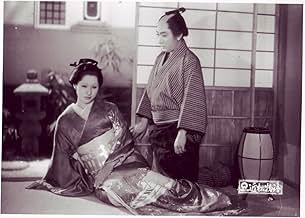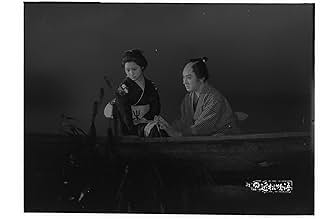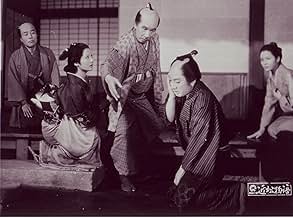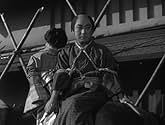IMDb रेटिंग
8.0/10
5.3 हज़ार
आपकी रेटिंग
अपनी भाषा में प्लॉट जोड़ेंIshun is a wealthy but unsympathetic master printer who has wrongly accused his wife and best employee of being lovers. To escape punishment, the accused run away together, but Ishun is cert... सभी पढ़ेंIshun is a wealthy but unsympathetic master printer who has wrongly accused his wife and best employee of being lovers. To escape punishment, the accused run away together, but Ishun is certain to be ruined if word gets out.Ishun is a wealthy but unsympathetic master printer who has wrongly accused his wife and best employee of being lovers. To escape punishment, the accused run away together, but Ishun is certain to be ruined if word gets out.
- पुरस्कार
- 1 जीत और कुल 2 नामांकन
Eitarô Ozawa
- Sukeemon
- (as Sakae Ozawa)
फ़ीचर्ड समीक्षाएं
This is certainly a good film, beautifully photographed and evocatively acted. Yet one should certainly criticize it, and Mizoguchi, for it is not without flaws and weaknesses. Mizoguchi really cared for women, and wanted to make statements on man's lack of sympathy and total cruelty, yet he sometimes gets ahead of himself in trying to make this statement by adopting the wrong means. This is certainly a case in 'the Crucified Lovers', 'Princess Yang Kwei Fei' and 'Zankiku monogatari'. He sets the scenario in feudal Japan, which leaves the viewer at the end with the partially right exclamation: "boy, does feudalism suck, I'm glad that it is over...". And true, some of the scenarios such weaker films of Mizoguchi present would be literary impossible today. Also, his women characters sometimes become archetypes of unrealistic self-sacrifice, which also simplifies the scenario less appealing. Saying that, "Crucified Lovers" is a good film, with such few relative weaknesses, though the sometimes chilly, cynical prose by Ueda, the screenwriter helps this film allot. I still highly prefer and recommend Mizoguchi's 'realistic, 'contemprary' films of 1936: 'Osaka Elegy' and 'Sisters of the Gion', as well as his late masterpieces, in which he showed more restraint and subtlety: 'Ugetsu', 'Sansho Dayu', and 'The Life of Oharu'.
The only print of CHIKAMATUS MONOGATARI I've been able to find was abysmal - I almost couldn't watch it. Which is a shame as this is among the greatest Mizoguchi films. The story - which I believe had been done before and since by other Japanese directors - is a bit straighter than my favorite Mizoguchi films (SANSHO THE BAILIFF and UGETSU MONOGATARI), and is essentially a tale of tragic romance, in this case a transgressive romance that crosses strict class boundaries. As always with Mizoguchi, there is an exquisitely expressed tone of defiance, and - bad print aside - I was very pleased. As with all of Mizoguchi's films, I'm eagerly awaiting a restored DVD release - whenever that may come...
Set in 17th century Japan, and based on a 1715 play by Chikamatsu Monzaemon (hence the title, 'A Story From Chikamatsu'), this film starts with a rich scroll-maker (Eitarō Shindō) refusing to give his wife (Kyōko Kagawa) money. When she turns to one of his top apprentices (Kazuo Hasegawa), she sets in motion of a chain of events that ultimately have them fleeing together, because the apprentice, normally a virtuous man, intended to take the money from the scroll-maker and was caught.
The story reveals emotion and desire that is both on the surface, such as the scroll-maker sexually harassing a young servant (Yōko Minamida), as well as that which is concealed. It shows us the randomness of events which may cause everything to suddenly change in one's life; as the wife puts it at one point, "Nothing is more unpredictable than a person's fate. In just one day, all of this has happened to us." If you've ever had your life flip suddenly because of love, you'll identify.
The film also shows the all-too-common fate of women; the advice given to the young servant being harassed is to "Just take it. That's the duty of an employee." Adultery is also blamed first and foremost on the women ("It's frightening what women are capable of"), and it's ominous when a couple of adulterers are being led through the town to be crucified early on in the film.
It's a solid film throughout – the cast is strong, the story is well told, and there are some gorgeous scenes, one of which is in a bamboo forest. I don't think it's going to blow you away, but it's a good one.
The story reveals emotion and desire that is both on the surface, such as the scroll-maker sexually harassing a young servant (Yōko Minamida), as well as that which is concealed. It shows us the randomness of events which may cause everything to suddenly change in one's life; as the wife puts it at one point, "Nothing is more unpredictable than a person's fate. In just one day, all of this has happened to us." If you've ever had your life flip suddenly because of love, you'll identify.
The film also shows the all-too-common fate of women; the advice given to the young servant being harassed is to "Just take it. That's the duty of an employee." Adultery is also blamed first and foremost on the women ("It's frightening what women are capable of"), and it's ominous when a couple of adulterers are being led through the town to be crucified early on in the film.
It's a solid film throughout – the cast is strong, the story is well told, and there are some gorgeous scenes, one of which is in a bamboo forest. I don't think it's going to blow you away, but it's a good one.
"Chikamatsu Monogatari" , (aka "The Crucified Lovers"), is one Mizoguchi's lesser known works and yet it is no less extraordinary for all that. It is, of course, typical of its director; another tragic tale of corrupted innocence and the terrible hand fate plays in people's lives, in this case a wrongful accusation of adultery over a very simple misunderstanding. Shakespeare could have written this.
It's set in the 17th century and it paints as relentless a picture of cruelty and hypocrisy as Mizoguchi has given us and he shoots it almost in semi-darkness, (even the exteriors take place at night or are shrouded in mist or in shadow), so there is no escape for its protagonists nor for us; the inevitability of the lovers' fate is clearly signposted from the beginning.
As the couple forced to acknowledge their love for each other by unfolding events Kazuo Hasegawa and Kyoko Kagawa are superb, particularly Kagawa whose performance as the wronged wife is a masterclass in subtlety and tenderness. This is surely one of the key films in all of Japanese cinema.
It's set in the 17th century and it paints as relentless a picture of cruelty and hypocrisy as Mizoguchi has given us and he shoots it almost in semi-darkness, (even the exteriors take place at night or are shrouded in mist or in shadow), so there is no escape for its protagonists nor for us; the inevitability of the lovers' fate is clearly signposted from the beginning.
As the couple forced to acknowledge their love for each other by unfolding events Kazuo Hasegawa and Kyoko Kagawa are superb, particularly Kagawa whose performance as the wronged wife is a masterclass in subtlety and tenderness. This is surely one of the key films in all of Japanese cinema.
I think this makes it official: no major filmmaker ever utilized lakes as well as did Kenji Mizoguchi. Between the canoe chase in Sansho the Bailiff and the suicide attempt seen in this film, it can safely be said that the Japanese director was the cinematic master of lake imagery.
The images here, by Mizoguchi and DP Kazuo Miyagawa, who also lensed many of Kurosawa's most iconic films, are consistently gorgeous. More than that, though, Chikamatsu is, I think, the most perfect encapsulation of Mizoguchi's central theme: the self-annihilating ecstasy that comes with turning one's back on an unjust social order.
Perhaps "encapsulate" is a particularly good word to use because one of the reasons the themes are so brazen is that Mizoguchi is here working on a far smaller canvas than he usually allows himself. This film is quite short by the director's standards, and deals with a smaller number of characters. Perhaps because of its less epic scope I would rank it just below the previously mentioned Sansho the Bailiff as my favorite film by this great director.
The images here, by Mizoguchi and DP Kazuo Miyagawa, who also lensed many of Kurosawa's most iconic films, are consistently gorgeous. More than that, though, Chikamatsu is, I think, the most perfect encapsulation of Mizoguchi's central theme: the self-annihilating ecstasy that comes with turning one's back on an unjust social order.
Perhaps "encapsulate" is a particularly good word to use because one of the reasons the themes are so brazen is that Mizoguchi is here working on a far smaller canvas than he usually allows himself. This film is quite short by the director's standards, and deals with a smaller number of characters. Perhaps because of its less epic scope I would rank it just below the previously mentioned Sansho the Bailiff as my favorite film by this great director.
क्या आपको पता है
- ट्रिवियाThe movie is based on a play by the classic Japanese author Monzaemon Chikamatsu (1653-1725). The original title "Chikamatsu monogatari" means "A Tale From Chikamatsu".
- कनेक्शनFeatured in Histoire(s) du cinéma: Toutes les histoires (1988)
टॉप पसंद
रेटिंग देने के लिए साइन-इन करें और वैयक्तिकृत सुझावों के लिए वॉचलिस्ट करें
- How long is A Story from Chikamatsu?Alexa द्वारा संचालित
विवरण
- रिलीज़ की तारीख़
- कंट्री ऑफ़ ओरिजिन
- भाषा
- इस रूप में भी जाना जाता है
- A Story from Chikamatsu
- उत्पादन कंपनी
- IMDbPro पर और कंपनी क्रेडिट देखें
बॉक्स ऑफ़िस
- दुनिया भर में सकल
- $9,311
- चलने की अवधि
- 1 घं 42 मि(102 min)
- रंग
- पक्ष अनुपात
- 1.37 : 1
इस पेज में योगदान दें
किसी बदलाव का सुझाव दें या अनुपलब्ध कॉन्टेंट जोड़ें






























